Swiss await showdown over guns and bullets

Switzerland is preparing for a lively debate this summer over its long-standing tradition of keeping army guns and ammunition at home.
Opposition to its guns-at-home culture seems to have gained momentum and critics are launching a people’s initiative on the issue.
Attitudes towards firearms may be changing in Switzerland, which is well known for its militia army, strong traditions and liberal gun laws. A recent survey found that two out of three Swiss want to ban army weapons from private households.
Centre-left political parties and pacifist groups are hoping to build on these signs of public disapproval to force a nationwide vote. They are due to start collecting signatures for a people’s initiative from August this year.
The initiative is calling for army weapons to remain in the barracks, a national gun register, a ban on private individuals buying or owning particularly dangerous guns such as automatic weapons or pump-action shotguns, and tighter controls on those who say they need to carry a firearm.
Green parliamentarian Jo Lang, who is behind the proposal, argues that keeping an army gun at home is “a major security risk” and that “there are no practical arguments – only ideological ones”.
“Every year about 300 people die from army-issue guns in Switzerland. The majority of cases are suicides, but there are also family tragedies,” he told swissinfo.
Lang has first-hand experience of the dangers of putting a gun in the wrong hands. In 2001 he was in Zug’s cantonal parliament when a gunman shot and killed 14 people with a rifle, before turning it on himself.
“Most people have a gun not because they like it, but because they have to take it home,” he said.
Social problem
Under Swiss law all able-bodied men are issued with a rifle and 50 rounds of ammunition, which they store at home after completing basic training and can keep after finishing their military service.
No one knows exactly how many guns are in Switzerland – estimates range from 1.2 to 20 million – partly as the tradition of keeping army guns dates back to the 19th century.
Gun advocates argue that tighter controls would go against age-old Swiss custom, would not stop crime and would not have prevented massacres like the one in Zug.
“Every misuse of a weapon is not the fault of the weapon – it’s the person behind it; it’s a problem of society,” said Hermann Suter of the pro-gun lobby group, Pro Tell. “The strategic goal of the initiative is the abolition of the militia army over the next 20 years.”
But for Jean-Pierre Monti, president of the federal police staff association, a vote could have a positive impact: “It is not going to stop suicides or criminal acts, but it could limit them.”

More
People’s initiative
Heading them off…
Ahead of the launch of the initiative, the Senate on Wednesday debated and rejected an outright ban on storing army weapons at home. But it did pass a motion which would prevent most soldiers from keeping their ammunition in the home.
The government had earlier come out in favour of a plan to allow only certain troops to take their guns and ammunition home.
“They’re trying to pull the rug out from under our feet as they know our text could be accepted by the people,” said Lang, who remains defiant that the initiative will not be withdrawn.
The Green parliamentarian expects tough discussions over the weeks and months to come, particularly in parliament, which is “dominated by men over 60… hardcore army lobbyists”.
“In Switzerland there was an old saying: ‘A man who can’t defend himself and his family with a weapon has no honour.’ This tradition still exists in certain circles,” said Lang. “And they understand an attack on this tradition as an attack on the army itself.”
Sharp end
So what do those at the sharp end – the soldiers themselves – actually think?
“I don’t see any need to keep weapons at home, but leaving weapons in warehouses will require a lot of money to build up a new system,” said Florian Emonet, an army shooting instructor.
“Keeping a gun at home is a reminder of the Cold War, and is not necessary for instruction or security purposes.”
So what are the practical arguments for keeping a gun at home?
“The need for instruction so that people can train. But we know that no one is doing it seriously apart from during annual obligatory shooting practice. Most don’t shoot with their guns, they just store them somewhere. I’m sure in a few years there will be no more guns at home and things will change.”
swissinfo, Simon Bradley
Estimations of the number of firearms in circulation in Switzerland range from 1.2 to 20 million.
Army-issue weapons are said to be involved in the deaths of more than 300 people in Switzerland every year.
According to Ipsilon Suicide Prevention, 34% of suicides among men are due to firearms, compared with only 3.7% of female suicides.
In April a survey found that 65.6% of citizens would vote to ban army weapons from the home, 69% were in favour of a national gun register and 37% said a ban on storing army weapons would prevent family tragedies.

In compliance with the JTI standards
More: SWI swissinfo.ch certified by the Journalism Trust Initiative

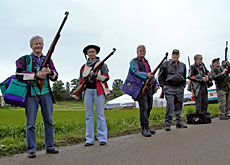
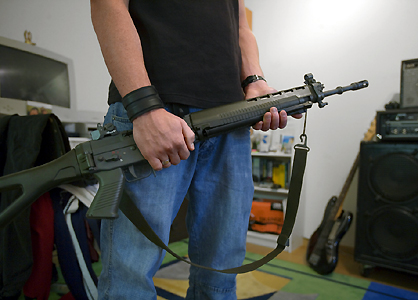
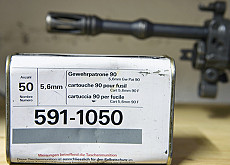
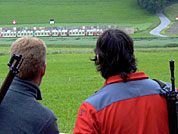
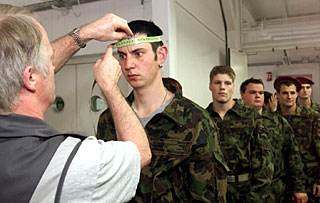
You can find an overview of ongoing debates with our journalists here. Please join us!
If you want to start a conversation about a topic raised in this article or want to report factual errors, email us at english@swissinfo.ch.